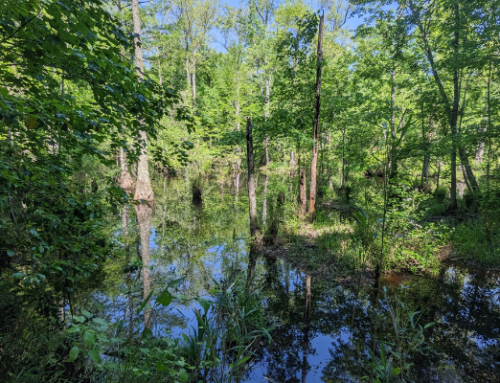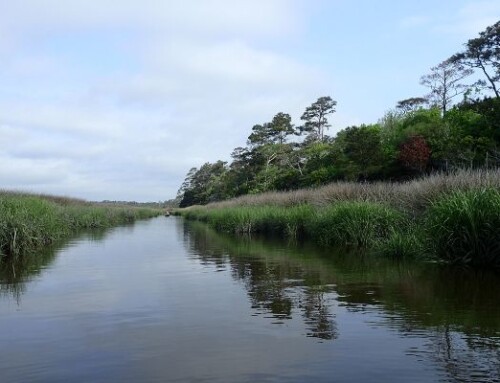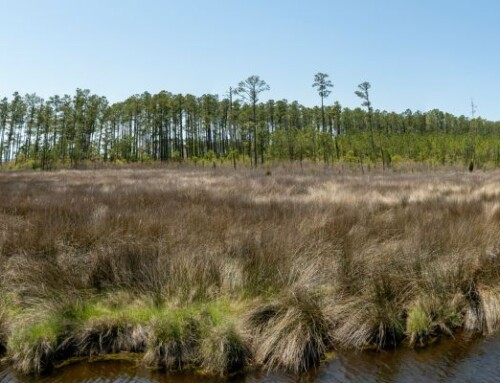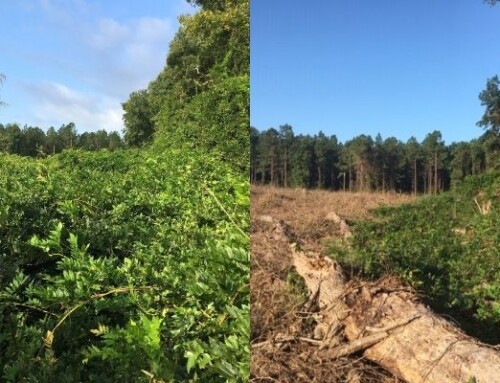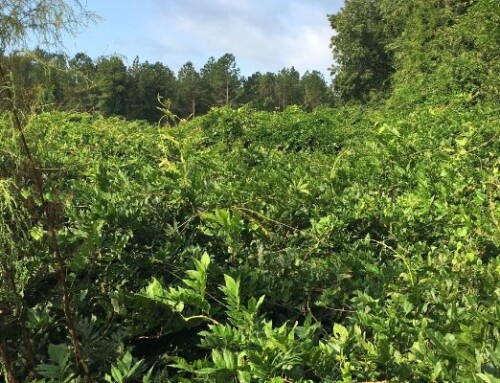Giving Bees and Butterflies a Hand
By Denise Patterson, reprinted with permission from Coastal Review Online (March 2015)
[Ed. note: In celebration of PollinatorPalooza, April 12-17, 2021, we are reprinting this article about the pollinator meadow that the students of Betty Dixon Elementary School and the Coastal Land Trust planted on our Everett Creek Preserve in Onslow County. What a great partnership it was!]
It is a tale as old as time — the story of the birds and the bees. Well, bees, anyway.
Since the beginning, humans have relied on a partnership with nature to survive. So it is only natural that when the tiniest workers in the human food chain are in danger, it is time to give them a little helping hand.
That’s exactly what the students at Dixon Elementary School in Holly Ridge did this spring.
Onslow County’s Dixon Elementary helped create a new quarter-acre pollinator garden for bees and butterflies, on the Coastal Land Trust’s Everett Creek Preserve next to the school. The students planted 12 different species of plants favored by pollinators, including milkweed, asters, purple coneflower, black-eyed Susans, sunflowers and butterfly weed. In all, 24 students and parent volunteers worked with the Coastal Land Trust’s staff, and volunteers from Duke Progress, to plant over 600 pollinator plants.
Teacher Kristen McCutcheon is excited about the project. “This is more than a garden. This project has given select students in first through third grade a wonderful opportunity to solve real world sustainability issues,” she said.
“This has been such a pleasure and huge learning experience for myself and the children here at Dixon Elementary,” McCutcheon said. “I am simply blown away by the shear amount of support by the countless volunteers that turned out from many aspects of the community in order for the day to run as smoothly as it did.”
- PC – Amy Mead
“Taking this piece of overgrown land and turning it into something beautiful is a learning experience that will become a lasting memory for these children. And hopefully even for some, be the start of a budding love and interest for the environment around them,” McCutcheon said.
Janice Allen, director of land protection at the Coastal Land Trust agrees. “We are very pleased to work with our neighbor to create the pollinator garden,” she said. “It is a great way to get kids involved with nature.”
The Coastal Land Trust owns a 250-acre tract along Everett Creek, across the road from the school. Much of the property is currently being restored to a longleaf pine forest. Now, the Coastal Land Trust has a pollinator garden as well. In the future, another larger 2-3 acres of the property will be turned into a pollinator meadow.
Allen hopes that the partnership will expand to include the school using the Everett Creek property as an outdoor classroom. “The land will serve the extended community as a nature preserve, so it is only natural that it be used for elementary education,” she said.
Millie M. Chalk, District Manager for Duke Energy led a crew of four enthusiastic Duke volunteers who helped assist the children in planting the pollinator garden. “What a great opportunity to share the importance of protecting our environment with these young students”, she said. Duke Energy’s Foundation has provided a grant that is helping the Coastal Land Trust provide more environmental education at this preserve and others.
Recent statistics about the decline in pollinator species are daunting. Honeybee populations have been in steady decline for a decade, and just last year the number of Monarch butterflies migrating south has been the lowest ever recorded. As a result, in 2014, President Obama issued a memorandum to all federal agencies to promote the health of honeybees and other pollinators across the country.
“For Monarch populations to rebound, it is vital that we act now,” said John Ann Shearer, Partners for Fish and Wildlife State Coordinator for the U.S. Fish and Wildlife Services. “So much of their habitat has been lost in our state due to development and regular mowing.”
The Fish and Wildlife Services works regularly with the Coastal Land Trust and is chipping in on the pollinator gardens. Duke Progress also contributed funds and volunteer assistance with the garden.
“We were already working with the Coastal Land Trust to restore longleaf pine on private lands,” said Shearer. “We were able to add $33,000 to that cooperative agreement this past December to fund several projects to create pollinator gardens and in particular, to provide milkweed for Monarch butterflies.”
Pollinator gardens that include milkweed plants provide habitats for the Monarchs to reproduce. Other native pollinator plants provide essential food for the migrating butterflies. Shearer says, “Across the state, the gardens will provide essential habitats but also serve to support educational and outreach efforts associated with pollinator habitats.”
The Coastal Land Trust is administering a federal grant fund for the statewide effort and will distribute money to other groups as part of the mission. The North Carolina Botanical Garden will propagate native milkweed plants for planting across the state. The garden also owns undeveloped land in the Piedmont, where they will plant milkweed plugs.
Other partners include the N.C. Wildlife Resources Commission and Wake County and Raleigh parks and recreation departments. These groups will receive milkweed plants to place in existing fields, under power lines and along the edges of streams and rivers.
“Growing milkweed in old fields and meadows and even in small gardens can provide more habitat for Monarch butterflies,” explained Shearer. “Everything we can do to educate the public about the importance of preserving pollinator species will help to increase their numbers in North Carolina.”
Shearer is excited about this new team effort. “It amazes me how they continue to find opportunities to encourage landowners to return the land to its natural condition for the benefit of native wildlife and their willingness to support Monarch projects across the state is a fine example of their commitment to native habitats,” she said.
PC – Featured image Tom Earnhardt






